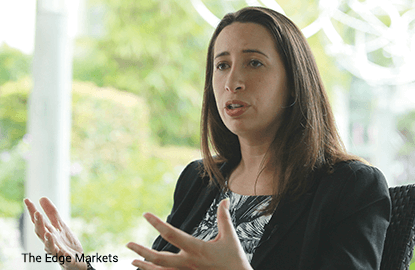
This article first appeared in The Edge Financial Daily, on March 21, 2016.

KUALA LUMPUR: The Sustainable Palm Oil Transparency Toolkit (Spott) — an interactive online tool that uses satellite mapping technology, with performance assessments, to monitor sustainable operations of listed palm oil companies — has garnered support from the palm oil industry.
Since its launch in November 2014, the Zoological Society of London (ZSL), a charity devoted to worldwide conservation of animals and their habitats, and the developer of the toolkit, has roped in 50 companies last year from the 25 it registered in 2014 to take part in Spott.
ZSL global palm oil manager Leonie Lawrence told The Edge Financial Daily via email recently that the 50 companies constitute about half of all land under oil palm cultivation.
“We are exploring developing transparency toolkits for other commodities, such as pulp or timber,” she said.
“We also plan to expand our interactive mapping tool to feature more environmental data, and add new and improved resources for stakeholders across the supply chain,” she added.
She also said the tool has received a host of positive responses from companies, many of which have contacted ZSL directly for advice on how to increase transparency and improve their scores.
“Some have also made reference to Spott in their annual reports. It is a very competitive market, and because many companies care about protecting the environment, they benefit from the value of protecting biodiversity and ecosystem services, not just for their local operations, but also for their improved public image,” she said.
“From the start of the process, we send all companies copies of their assessments before publication to ensure accuracy and fairness, and to incentivise improvement,” she added.
Spott generates percentage scores for each company based on their performance against more than 50 best practice indicators over seven categories that revolve around sustainable operations.
A dedicated website not only features regularly updated assessments for 50 of the world’s largest palm oil producing companies using publicly available information about the sustainability of their operations, but also provides advice and information to stakeholders in the palm oil supply chain.
ZSL business and biodiversity manager Elizabeth Clarke said so far, over 80% of companies have improved their scores since assessments began in June 2014.
“In several cases, we have seen increases in transparency by more than 20%, which is very encouraging. However, there are still some companies which have yet to score a single point,” she said.
“We hope that stakeholders will continue to use Spott to support sustainable palm oil, to inform their engagement with companies when making decisions about investing in or buying from palm oil producers,” she added.
She also said over the last 18 months, the Spott website has received over a quarter of a million views from over 180 countries, as well as more than 1,500 subscribers to its email newsletter.
However, the implementation of the tool is not without challenges.
Clarke said Spott's usage of interactive satellite mapping tool to display company concession site maps, overlaid with data on forest loss and active fire alerts from Global Forest Watch, has been hampered by legal constraints on the publication of map-related data in Indonesia and Malaysia.
“Recently, concerns have been raised in Indonesia and Malaysia associated with whether it is legal for companies to disclose their concession site data,” she said.
“ZSL supports the disclosure of this data as a key component of greater transparency. However, we have had to respond to these issues by disabling our map-related indicators temporarily, while the disputes are settled. We hope that this matter will be resolved as soon as possible,” she added.
Indonesia and Malaysia have laws that limit the publication of concession maps to third-party organisations. In Malaysia, the wide ambits of the Official Secrets Act 1972 deem the publication of concession maps to third-party organisations as illegal.
The Indonesian government, on the other hand, has drawn up a one-map policy for geospatial information management that would provide companies with limited freedom for the sharing of maps of oil palm concession areas, as well as surrounding areas.
ZSL’s Lawrence said Spott had also worked with the Roundtable on Sustainable Palm Oil (RSPO) to successfully pass a resolution to improve the RSPO’s annual reporting process, thereby increasing transparency for over 2,000 members across the organisation.
“Spott is not a standard in its own right, but our indicators are aligned with a number of schemes including RSPO, Roundtable on Sustainable Biomaterials, and the International Sustainability and Carbon Certification system, as well as a relevant assessment on the sustainable commitment database, Supply Change,” she said.
“We want to work with responsible businesses to ensure their commitments are implemented on the ground,” she added.